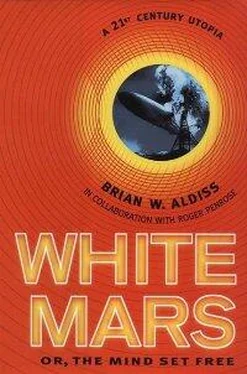Brian Aldiss - White Mars
Здесь есть возможность читать онлайн «Brian Aldiss - White Mars» весь текст электронной книги совершенно бесплатно (целиком полную версию без сокращений). В некоторых случаях можно слушать аудио, скачать через торрент в формате fb2 и присутствует краткое содержание. Год выпуска: 1999, ISBN: 1999, Издательство: Little, Brown UK, Жанр: Фантастика и фэнтези, на английском языке. Описание произведения, (предисловие) а так же отзывы посетителей доступны на портале библиотеки ЛибКат.
- Название:White Mars
- Автор:
- Издательство:Little, Brown UK
- Жанр:
- Год:1999
- ISBN:0-316-85243-0
- Рейтинг книги:5 / 5. Голосов: 1
-
Избранное:Добавить в избранное
- Отзывы:
-
Ваша оценка:
- 100
- 1
- 2
- 3
- 4
- 5
White Mars: краткое содержание, описание и аннотация
Предлагаем к чтению аннотацию, описание, краткое содержание или предисловие (зависит от того, что написал сам автор книги «White Mars»). Если вы не нашли необходимую информацию о книге — напишите в комментариях, мы постараемся отыскать её.
White Mars — читать онлайн бесплатно полную книгу (весь текст) целиком
Ниже представлен текст книги, разбитый по страницам. Система сохранения места последней прочитанной страницы, позволяет с удобством читать онлайн бесплатно книгу «White Mars», без необходимости каждый раз заново искать на чём Вы остановились. Поставьте закладку, и сможете в любой момент перейти на страницу, на которой закончили чтение.
Интервал:
Закладка:
“You are the fascist,” I said. “You wanted to rule by force. I want to use persuasion—to bring about a just and decent society here, not a mob.”
He challenged me to define just and decent.
I told him I would not define what the words meant just then, particularly since I had never experienced a just and decent society. Nevertheless, I hoped that we would work together to form a society based on those principles. We all knew what just and decent meant in practice, even if we did not define them with precision. And I hoped that in a few months we would recognise them as prevailing in Mars City.
The man listened closely to this, pausing before he spoke.
“My name, sir, is Stephens, Beaumont Stephens, known as ‘Beau’. I will assist your endeavours if you will free me from these handcuffs.”
I told him that he must serve his punishment. Then he would be welcome to help me.
Our forum found a powerful supporter in Mary Fangold, the woman who ran the Reception House. She was a neat, rather severe-looking woman in her late thirties, of Mediterranean cast, with dark hair cut short, and striking dark blue eyes. I had developed a strong liking for her through her kindness to Antonia in the latter’s last days.
“If we are to survive here as a society, then everyone must be given a chance to be part of that society.” Her voice, while far from shrill, held a ring of conviction. I was to find that indeed she was a woman with a strong will. “On Earth, as we all know, millions of people are thrown on the scrap heap. They’re unemployed, degraded, rendered useless, while the rich and Megarich employ androids. These wasteful creatures are the new enemies of the poor—as well as being inefficient.
“It’s no good talking about a just society. First of all, we must ensure that everyone works, and is kept busy at a job that suits her or his intellect.”
“What job is that?” someone shouted.
Mary Fangold replied coolly, “My Reception House must become our hospital. I need enlarged premises, more wards, more equipment of all kinds. Come and see me tomorrow.”
While I had anticipated that many of us would harbour negative responses, even feeling suicidal, about being stranded on Mars, I had not expected so many clearly stated objections to everyday existence on Earth. These the forum wished to discuss first of all, as bugbears to be disposed of.
These bugbears came roughly under five heads, we finally decided. The first four were Mistaken Historicism, Transcendics, Market Domination and Popular Subscription, all of which made existence more difficult than it need be for the multitudinous occupants of our green mother planet. Fifthly, there was the older problem of the rich and the poor, the Haves and Have Nots, a problem of heightened intensity since a long-living Megarich class had developed.
When it came my turn to sum up the debate, which continued for some days, I had this to say (I’m checking here with the records):
“Some issues on Earth are much discussed, or at least make the headlines. They consist in the main of crime, education, abortion, sex, climate, and maybe a few other issues of more local interest. These issues could be fairly easily dealt with, if the will were there.
“For instance, education could be improved if the teaching profession were paid more and better respected. That would happen if children and their futures were the subject of more active general concern. And, if that were the case, then crime rates would fall, since it is the disappointed and angry child who becomes the adult lawbreaker. And so on.
“Unfortunately, a dumbing-down of culture has precluded the general consideration of five issues about which you have expressed unhappiness. They are far less easy to deal with, being more nebulous. Perhaps they are difficult to discern in the general hubbub of competing voices and anxieties. The six thousand of us assembled here must seize on the time and chance we have been given to consider and, if possible, to eliminate these issues.
“I will take these issues, which do not mirror our needs for a decent society and are impediments to such a society, one by one, although they are interrelated.
“Mistaken Historicism is a clumsy label for the problems of squaring a global culture with varied local traditions. The problems spring perhaps from conflating human history with evolutionary development. We are prone to conceive of deep cultural differences as merely an episode on the way to a universal consensus—a developmental phase, let’s say, to an homogenous civilisation. Our expectation is that these various local traditions will die out and the global population become homogenised. This idea is patronising, and will not hold water much longer, as the days of Euro-Caucasian hegemony draw to a close.
“For example, we cannot expect the quarter of the terrestrial population that speaks a Chinese language to convert to English instead. Nor can we expect those whose faith is in Mohammed to turn into churchgoers of the Methodist persuasion. The Chinese and the Muslims may fly by airplanes manufactured in the United States for at least a few decades longer: that does not alter their inward beliefs in the superiority of their own traditions one whit.
“We observe the tenacity of tradition even within the European Union. A Swede may spend all his working life in Trieste, designing parts for the fridge wagons; he may speak fluent Italian and enjoy the local pasta; he may holiday on the beaches of Rimini. But, when it comes time to retire, he returns to Sweden, buys a bungalow in the archipelago, and behaves as if he had never left home. He soon forgets how to speak Italian.
“Our traditional roots are valuable to us. We may argue whether or not they should be, but the fact remains that they are. Nor are the arguments against them always valid.
“For instance, such roots are supposedly the cause of war. True, certainly they have been in the past. There were the Crusades, the Opium Wars against China, and so on and so forth. But modern wars, when they happen, are most frequently not between different civilisations but are waged among the same civilisations, as were the terrible wars in Europe between 1914 and 1918 and 1939 and 1945.
“The mistaken assumption that cultural differences are going to disappear and a single civilisation will prevail, perhaps in the manner of Mr. H.G. Wells’s Modern Utopia, has precluded constructive intellectual thought on ways to ease friction between cultures which are, in fact, permanent and rather obdurate features of the world in which we have to live. The sorry tale of the conflict between Israel and Palestine is a recent example of the ill effects of Mistaken Historicism.
“If we could drop our Mistaken Historicism, we might establish more effective international buffers for intercultural relationships.”
At this point there was an important intervention by a small sharp-featured man with scanty white hair. He rose and introduced himself as Charles Bondi, a worker on the Smudge Project, whom we already knew was one of the prime movers of the scientific project.
“While I take your point about linguistic differences and religious differences and so forth,” he said, in a pleasant husky voice, “these are all global items we have learned to put up with, and to some extent overcome. I believe it might be claimed that cultural differences are dying out, at least where it matters, in public relations. Certainly there is evidence of a fairly general wish to help them die out, or else we would have no revived United Nationalities.
“You could argue, indeed, that Mistaken Historicism was mistaken but is no longer. Don’t we see a convergence in prevailing attitudes of materialism, for instance, in East and West—and all points in between? What we want is a new idea, something that overrides cultural difference. I believe that the revelations that the detection of a Smudge phenomenon will grant us could be that transforming idea.”
Читать дальшеИнтервал:
Закладка:
Похожие книги на «White Mars»
Представляем Вашему вниманию похожие книги на «White Mars» списком для выбора. Мы отобрали схожую по названию и смыслу литературу в надежде предоставить читателям больше вариантов отыскать новые, интересные, ещё непрочитанные произведения.
Обсуждение, отзывы о книге «White Mars» и просто собственные мнения читателей. Оставьте ваши комментарии, напишите, что Вы думаете о произведении, его смысле или главных героях. Укажите что конкретно понравилось, а что нет, и почему Вы так считаете.










